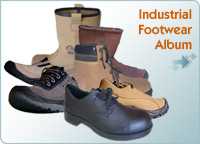 |
|
Selecting the correct materials: Selecting the correct materials is critical, especially when contaminants are present. By choosing the correct material the maximum lifespan of your footwear can be achieved. Nitrile rubber sole : For higher temperatures, oil and solvent resistant. Polyurethane soles : For general purpose use, light weight, oil and solvent resistant. Anti-static footwear : To dissipate static electricity. Water repellent leather uppers : Where there is an occasional exposure to water. Micro-fibre (wat-out) uppers : Where greater resistance to certain chemicals and oil is required. PVC, PVC nitrile, rubber and polyurethane uppers : Where there is long term exposure to water and certain chemical applications. Cambrelle/Thinsulate/Thermalite linings : For greater comfort and temperature control of feet. Gore-tex, Sympatex and other waterproof membranes inside leather upper : Allow the feet to breath whilst offering complete protection from water penetration. Materials and Construction: There are various methods of attaching the sole of the footwear to the upper material, and this has some considerable influence on product selection depending on the environment in which the footwear will be used. Direct vulcanised rubber soles : A traditional construction method which gives excellent durability in the harshest of environments. Direct injection moulding : A strong construction method, with either single density (polyurethane) or dual density (polyurethane / polyurethane with an outer density of nitrile rubber). Both types provide reduced weight with improved comfort and flexibility, without any compromise in performance. Goodyear welted : Another traditional form of construction where the sole is stitched to the upper material. Again a very strong method, which would generally be slightly heavier in use than the above. Suitable for most dry environments. Cemented : Exactly as it suggests, the sole is preformed and cemented (glued) onto the upper material creating a strong bond. Cushioned soles : Appropriate when standing for long periods of time. Wellington boots : The vast majority of Wellingtons in use are direct injection moulded, from either PVC with nitrile rubber or Polyurethane. Both types provide excellent flexibility and resistance to chemicals. Footwear Standards: Our Safety Footwear is governed by a European safety standard which forms part of legislation, it is therefore imperative that safety footwear is purchased from a reputable source and carries the fixed European Standard Mark EN345 for existing styles or the new conformity test ISO EN20345 that applies for recently certified or new products. To be certain which standard your safety footwear conforms to, please refer to the label on the footwear and/or the user guide that is provided in the box. All safety footwear that carries either mark has been tested in accordance with the standard and has the following features: • Safety toecap giving protection to 200 joules impact. • Has passed a compression test. • The upper material is of a quality and thickness that provides a level of abrasion resistance. • The sole compound is also tested for heat resistance, abrasion, shock absorption, and its resistance to both oil and certain chemicals. Within EN345 and EN20345 additional features can be added to the safety footwear which is needed depending on the environment for which they are being used. Adding numbers or letters after the EN345 or EN20345 mark denotes such features. Examples are: • SB - Safety Basic has all features required for the standard. • SBP - As SB with pierce resistant midsole • S1 - As SB with anti-static sole and cushioned heel area • S1P - As S1 with pierce resistant midsole • S2 - As S1 with water resistant upper • S3 - As S2 with pierce resistant midsole The other relevant European Standard Mark is EN347 for Occupational Footwear with anti-static and/or slip resistant properties. Safety footwear often carries European sizing, please see below and next for a comparison tables: Ladies' shoe sizes
Mens' shoe sizes
Boys' shoe sizes
Girls' shoe sizes
Although there are no shoes that protect feet from all the hazards that one is exposed to, one needs to analyze the risk and place according to restrictions on the work stations. At Yess we can tailor make the shoes that meet the comfort and protection requirements of our customers and we advise you to place orders to meet your worker safety and comfort to the optimum. » Checkout the industrial footwear album. |
About | Contact | Sitemap | Disclaimer
© YESS 2007-08. All rights reserved. yes2yess.com : eServices : corporateWWWDEVplug
